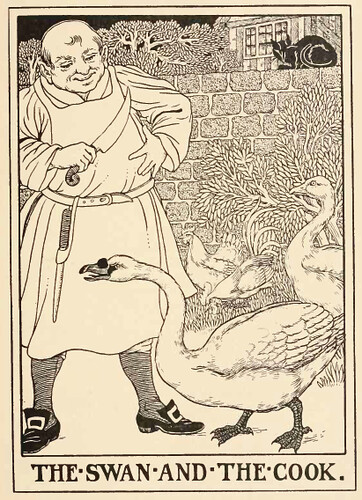HODIE: ante diem quintum Kalendas Maias.
GOOGLE BOOKS: Today's Google Books are Pasquier's Epigrammata and Pithou's Epigrammata.
MYTHS and LEGENDS: The art image for today's legend shows Achilles at Skyros; you can also see the legends for the current week listed together here.

TODAY'S DISTICHS and EMBLEMS: All the distichs come with vocabulary lists!
RHYMING DISTICHS: The two new Rhyming Distichs are Tempore felici, Tempore felici non cognoscuntur amici; / Sorte patet misera, quae sit dilectio vera; and Non oculis nota, Non oculis nota res est a corde remota, / Cordi raro datur, oculis quod raro notatur..
CATO'S DISTICHS: The two new Cato Distichs are Non pudeat, Non pudeat, quae nescieris, te velle doceri: / Scire aliquid laus est, culpa est nil discere velle; and Parce laudato, Parce laudato; nam quem tu saepe probaris, / Una dies, qualis fuerit, ostendit, amicus.
MARTIAL'S DISTICHS: The two new Martial Distichs are Cui legisse satis, Cui legisse satis non est epigrammata centum, / nil illi satis est, Caediciane, mali; and Milia misisti mihi, Milia misisti mihi sex bis sena petenti: / ut bis sena feram, bis duodena petam.
VERINUS DISTICHS: The two new distichs by Verinus are De Gloria, Gloria si dulcis, studeas virtute parare: / Quo labor est maior, gloria maior erit; and De Risu, Immodicus risus non est sapientis et index / Stultitiae; lepidi sint sine dente ioci.
OWEN'S DISTICHS: The two new Owen epigrams, with Harvey's English versions, are Patiens Inversus, et Patientia Divisa, Esse volo patiens, si nolo cogor, at in spe: / Hac ego fio potens entia cuncta pati; and Beatus, Undecimo Iuni tua par sors laeta videtur,
Post noctem fulsit lux tibi longa brevem.
CAMERARIUS'S EMBLEMS: The two new emblems are Praedae Spes Vana Capit, Pisciculos viden' ut pomposa cucurbita fallat? / Nil solidi illa tamen, sed tegit insidias.; and Haec Vera Potentia Est, Affectus quisquis mentis moderatur habenis, / Fertur equo domito; qui vagus, ille fero.
ROLLENHAGEN'S EMBLEMS: The two new emblems are In Spe Et Labore Transigo Vitam, Spes me alit atque labor, miseram sic transigo vitam; / Non nisi in aeterna est pace beata quies; and Non Dormit Qui Custodit, Detinet hunc non alta quies similisque sopori, / Qui vigili, nostras res, ratione, regit.

TODAY'S MOTTOES and PROVERBS:
TINY MOTTOES: Today's tiny motto is: Auxilio Dei (English: With God's help).
3-WORD PROVERBS: Today's 3-word verb-less proverb is Longae regum manus (English: Long are the hands of kings)
AUDIO PROVERBS: Today's audio Latin proverb is Est unusquisque faber ipsae suae fortunae (English: Each and every person is the maker of his own luck). To read a brief essay about this proverb and to listen to the audio, visit the Latin Via Proverbs blog.
PUBLILIUS SYRUS: Today's proverb from Publilius Syrus is: Mori est felicis, antequam mortem invoces (English: You're lucky if you die before you beg for death).
ERASMUS' ANIMALS: Today's animal proverb from Erasmus is Bestia bestiam novit (English: One beast knows another; from Adagia 4.7.57).
TODAY'S FABLES and STORIES:
ANECDOTE OF THE DAY: Today's anecdote is Polus Histrio, a wonderful anecdote about a tragic actor.
FABULAE FACILES WIDGET: The fable from the Fabulae Faciles widget is Pirata et Alexander Rex, a thought-provoking story about a pirate's bold words to Alexander the Great (this fable has a vocabulary list).
MILLE FABULAE: The "chunk" of Mille Fabulae et Una today is Fable 791, Minerva et Hercules, through Fable 800, Ceres et Rusticus, a fable of unintended consequences.
AESOP IN ENGLISH VERSE: Today's fable from the English verse widget is The Cat and Venus, a wonderful story about what happened when Venus turned a cat into a woman.
MILLE FABULAE WIDGET: The fable from the Mille Fabulae et Una widget is Olor et Anseres, a story about a swan mistaken for a goose: Pecuniosus quidam, qui anseres haberet domi, emit et olorem, et inter illos aluit; audierat enim suavissimum esse cantum olorinum. Cum autem vellet ad epulas iugulare nocte quadam anserem, ideo enim alebantur, forte cepit olorem, quod tenebrae discrimen inter hunc et illos fieri nullum sinerent. At olor carmen dulcissimum, quod aiunt illos facere solere ubi instare mortem sentiant, accinit, atque ita cognitus servatur. Commendat fabula doctrinam et in primis musica studia, quibus etiam mors ipsa saepe avertatur.
